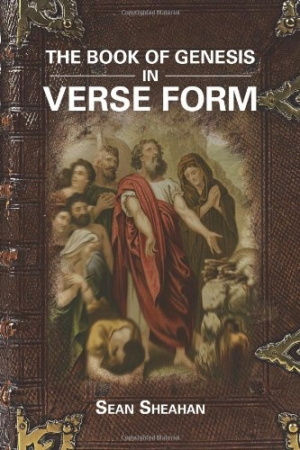The Book of Genesis in Verse Form
The Bible’s first book as distilled through rhyme brings a new perspective to an ancient text.
An imaginative retelling of Genesis, Sean Sheahan’s first collection aspires to make the first book of the Bible more accessible to teen audiences by distilling it into poetry. His brief, cheerful jaunt through the first biblical stories focuses on the patriarchs, necessarily omits much, and employs outside mythology surrounding the characters and events in Genesis.
Poetic license is a given in a project such as this, but it may still surprise readers that the author begins not with the Creation but with Lucifer’s fall from Heaven—a story, not from Genesis, that recalls the etiology presented by Milton in Paradise Lost. Perhaps this helps to flesh out the serpent’s backstory in the following poem, which runs for over a tenth of the book and focuses on Eden.
The author makes use of interpretive tropes throughout the book, including the rendering of the Tree of the Knowledge of Good and Evil as an apple tree and more scientifically centered notions of Earth’s creation (which doesn’t occur in a week in this book, but happens over “many, many years”). These images will, more than likely, be familiar to his young adult readership.
Sheahan, who plays with the spellings of biblical sites and characters, moves from Genesis to Cain and then to Noah (“Noe,” here, which proves useful in some end rhyming) and the flood. He maintains the two-by-two introduction of animals onto the ark and the covenant when the floods recede, but he omits other central details, like the sacrifice made to God once land is reached.
Sheahan’s Babel is a fable of human arrogance, his Abraham a character subject to feminine wiles. The near sacrifice of Isaac, left to the end of a poem that first recalls Ishmael and Hagar’s expulsion, lacks the suspense of the original, though the lesson is maintained. Sheahan succeeds in offering nontraditional perspectives into these familiar locales and characters.
The majority of the book belongs to Jacob and his progeny, with a wealth of space given to Joseph, his mischief, revelatory dreams, and time in Egypt. Again, some key stories are omitted—such as Jacob’s wrestling with an angelic figure. Such selectiveness suggests that Sheahan is less concerned with capturing Genesis’s theologies than he is with rendering appealing sketches of it.
Where Sheahan’s verses are playful, they shine, as with Eve’s “I do not care / it really is delicious; / Come taste its juicy succulence / And don’t be superstitious,” regarding her shamelessly gobbled apple. When the author’s commitment to end-rhyme poetry takes over, however, lines become more clunky: “The serpent me deceived,” “Satan set his mind / the couple to deceive.” Reading these poems may be a somewhat uneven experience.
Readers may not want to trade the original “archaic” language for this interpretation, but as a companion text, The Book of Genesis in Verse Form may help to explain why so many continue to be intrigued, if also confused, by the first book of the Bible.
Reviewed by
Michelle Anne Schingler
Disclosure: This article is not an endorsement, but a review. The publisher of this book provided free copies of the book and paid a small fee to have their book reviewed by a professional reviewer. Foreword Reviews and Clarion Reviews make no guarantee that the publisher will receive a positive review. Foreword Magazine, Inc. is disclosing this in accordance with the Federal Trade Commission’s 16 CFR, Part 255.

